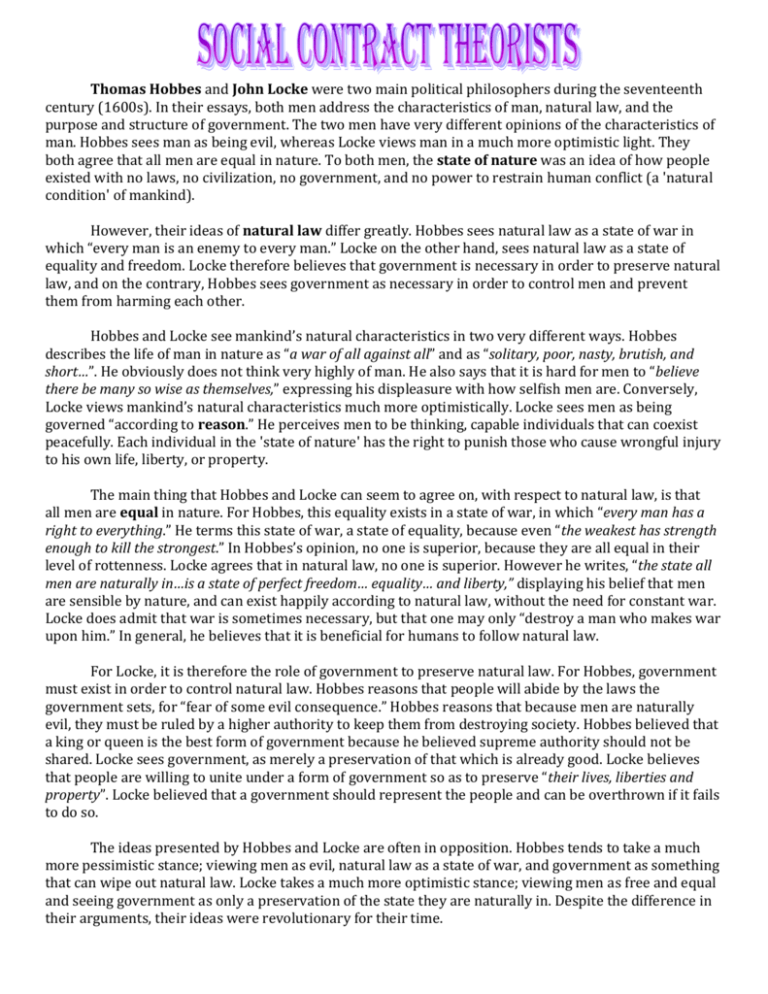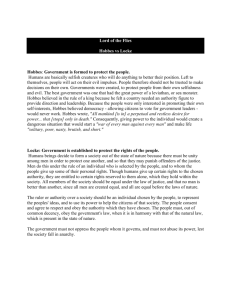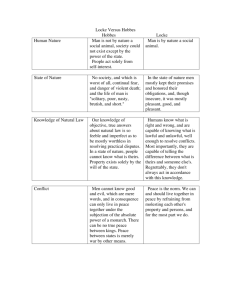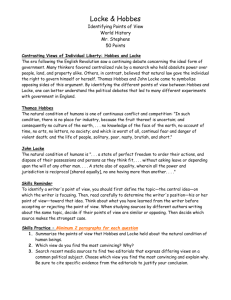Social Contract Theorists Thomas Hobbes and John Locke were two
advertisement

Thomas Hobbes and John Locke were two main political philosophers during the seventeenth century (1600s). In their essays, both men address the characteristics of man, natural law, and the purpose and structure of government. The two men have very different opinions of the characteristics of man. Hobbes sees man as being evil, whereas Locke views man in a much more optimistic light. They both agree that all men are equal in nature. To both men, the state of nature was an idea of how people existed with no laws, no civilization, no government, and no power to restrain human conflict (a 'natural condition' of mankind). However, their ideas of natural law differ greatly. Hobbes sees natural law as a state of war in which “every man is an enemy to every man.” Locke on the other hand, sees natural law as a state of equality and freedom. Locke therefore believes that government is necessary in order to preserve natural law, and on the contrary, Hobbes sees government as necessary in order to control men and prevent them from harming each other. Hobbes and Locke see mankind’s natural characteristics in two very different ways. Hobbes describes the life of man in nature as “a war of all against all” and as “solitary, poor, nasty, brutish, and short…”. He obviously does not think very highly of man. He also says that it is hard for men to “believe there be many so wise as themselves,” expressing his displeasure with how selfish men are. Conversely, Locke views mankind’s natural characteristics much more optimistically. Locke sees men as being governed “according to reason.” He perceives men to be thinking, capable individuals that can coexist peacefully. Each individual in the 'state of nature' has the right to punish those who cause wrongful injury to his own life, liberty, or property. The main thing that Hobbes and Locke can seem to agree on, with respect to natural law, is that all men are equal in nature. For Hobbes, this equality exists in a state of war, in which “every man has a right to everything.” He terms this state of war, a state of equality, because even “the weakest has strength enough to kill the strongest.” In Hobbes’s opinion, no one is superior, because they are all equal in their level of rottenness. Locke agrees that in natural law, no one is superior. However he writes, “the state all men are naturally in…is a state of perfect freedom… equality… and liberty,” displaying his belief that men are sensible by nature, and can exist happily according to natural law, without the need for constant war. Locke does admit that war is sometimes necessary, but that one may only “destroy a man who makes war upon him.” In general, he believes that it is beneficial for humans to follow natural law. For Locke, it is therefore the role of government to preserve natural law. For Hobbes, government must exist in order to control natural law. Hobbes reasons that people will abide by the laws the government sets, for “fear of some evil consequence.” Hobbes reasons that because men are naturally evil, they must be ruled by a higher authority to keep them from destroying society. Hobbes believed that a king or queen is the best form of government because he believed supreme authority should not be shared. Locke sees government, as merely a preservation of that which is already good. Locke believes that people are willing to unite under a form of government so as to preserve “their lives, liberties and property”. Locke believed that a government should represent the people and can be overthrown if it fails to do so. The ideas presented by Hobbes and Locke are often in opposition. Hobbes tends to take a much more pessimistic stance; viewing men as evil, natural law as a state of war, and government as something that can wipe out natural law. Locke takes a much more optimistic stance; viewing men as free and equal and seeing government as only a preservation of the state they are naturally in. Despite the difference in their arguments, their ideas were revolutionary for their time.






